Trump impeachment hearing updates: Judiciary panel hears evidence
House Democrats push ahead with articles of impeachment with a Judiciary Committee hearing to examine the evidence.
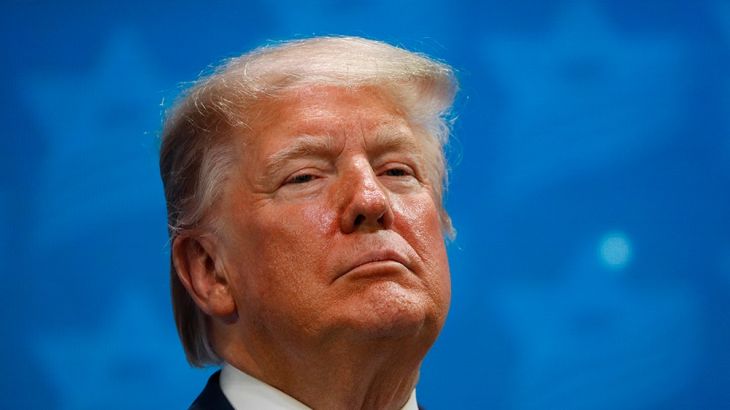
US House Democrats entered a new phase of the impeachment inquiry of President Donald Trump last week as the House Judiciary Committee took over and began hearings to debate and determine possible articles of impeachment.
The process continued on Monday with a marathon hearing of the House Judiciary Committee to examine the evidence in the investigation.
Keep reading
list of 1 itemThe House Judiciary Committee is expected to vote soon on at least two articles of impeachment against the Republican president. If formal charges are determined, the full House will vote on them. If passed, a trial would be held in the Senate.
As Democrats push ahead with articles of impeachment, here are all the latest updates as of Monday, December 9:
Monday’s hearing wraps up
Monday’s House Judiciary hearing wrapped up after a long day of, at times, lively exchanges between members of the committee and the lawyers representing their respective parties.
Read the key takeaways here.
‘Cheating to win an election’
Democrats are set to prepare at least two, if not more, articles of impeachment against Trump – likely charging him with an abuse of power and obstruction of Congress.
“President Trump’s persistent and continuing effort to coerce a foreign country to help him cheat to win an election is a clear and present danger to our free and fair elections and to our national security,” said Dan Goldman, the director of investigations at the House Intelligence Committee.
Republicans rejected not only Goldman’s conclusion as he presented the Intelligence Committee’s 300-page report on the Ukraine matter, but his very appearance before the Judiciary panel.
In a series of heated exchanges, they said Representative Adam Schiff, the chairman of the Intelligence Committee, should have appeared rather than send his lawyer.
“Where’s Adam?” asked Representative Doug Collins of Georgia, the top Republican on the Judiciary Committee.
“We want Schiff,” Trump ally Representative Matt Gaetz said.
Fiery hearing
Democrats and Republicans sparred with each other, with the former insisting that Trump’s push to have Ukraine investigate rival Joe Biden while withholding military aid, ran counter to US policy and benefited Russia, as well as the president, himself.
In one testy exchange, Republican lawyer Stephen Castor dismissed the transcript of Trump’s crucial call with Ukraine as “eight ambiguous lines” that did not amount to the president seeking a personal political favour.
Democrats argued that Trump’s meaning could not have been clearer in seeking political dirt on Biden, his possible opponent in the 2020 election.
Daniel Goldman, Democratic counsel on the Intelligence Committee, asked for his view, testified, “I don’t think there’s any other way to read the words on the page.”
The Judiciary Committee is reviewing the findings of the Intelligence panel’s report ahead of a vote, possibly as soon as this week, on two or more articles of impeachment on charges of abuse of power, bribery and obstruction against the Republican president.
A vote in the full House could come before Christmas.
FBI report: no political bias but many mistakes
The US Justice Department’s internal watchdog said it found numerous errors but no evidence of political bias by the FBI when it opened an investigation into contacts between Donald Trump’s presidential campaign and Russia in 2016.
The report by Inspector General Michael Horowitz found that the FBI had a legal “authorized purpose” to ask for court approval to begin surveillance of Carter Page, a Trump campaign adviser.
But Horowitz also found a total of 17 “basic and fundamental” errors and omissions in the original application and all subsequent renewals to the Foreign Intelligence Surveillance Court (FISA). Those errors made the case appear stronger than it was, Horowitz said.
The FBI investigation, launched in the summer of 2016 was taken over in May 2017 by former FBI chief Robert Mueller after Trump fired James Comey as the agency’s director.
The findings are likely to give ammunition to both Trump’s supporters and his Democratic critics in the ongoing debate about the legitimacy of the investigation.
Democrats sharpen accusations
Democrats described Trump’s pressuring of Ukraine to investigate a political rival as a “clear and present danger” to free and fair elections and national security.
“The evidence shows that Donald J Trump, the president of the United States, has put himself before his country. He has violated his most basic responsibilities to the people. He has broken his oath,” Representative Jerrold Nadler, the panel’s Democratic chairman, said.
Republicans fired back saying there weren’t enough facts to support the accusations, which are politically motivated.
“Presumption has now become the standard instead of truth,” said Representative Doug Collins, the ranking Republican on the panel.
“They’re desperate to have an impeachment vote on this president.”
Trump tweets
The White House said Trump was not watching Monday’s hearing, but the president still took to Twitter as the session kicked off, repeating his accusations that the inquiry is a “witch hunt”.
He also tweeted: “Read the transcripts!”
Read the Transcripts!
— Donald J. Trump (@realDonaldTrump) December 9, 2019
US House Judiciary chair rejects Republican witnesses
Nadler rejected Republican legislators’ request for eight witnesses to appear as part of the panel’s impeachment inquiry.
The requested witnesses fall “outside the parameters of the impeachment inquiry”, Nadler said in a letter to Collins.
Democratic counsel’s summary of main findings
Goldman outlined what he said were the “four key takeaways” of the impeachment inquiry:
- Trump used the power of office to pressure and induce the president of Ukraine to interfere in the 2020 presidential election for Trump’s personal and political benefit.
- Trump withheld an Oval Office meeting and $391m of essential military assistance from Ukraine in order to increase pressure on the Eastern European country.
- Trump sought to undermine the US’s free and fair elections and posed an imminent threat to national security.
- Trump directed an unprecedented effort to obstruct Congress’s impeachment inquiry into his conduct
Goldman said Trump’s scheme was simple: He directed a campaign to pressure Ukraine for political investigations; used the powers and tools of his office as leverage; everyone was in the loop and Trump continues to solicit foreign interference today.
Republican counsel: Democrats’ investigation ‘does not’ show high crimes and misdemeanours
The attorney for House Republicans in the impeachment inquiry into Trump said that the evidence presented by Democrats “does not show that president Trump abused the power of his office or obstructed justice”.
Steve Castor, the intelligence and judiciary committee Republican counsel, in outlining the Republicans case against bringing articles of impeachment against Trump, called the proceedings “baloney” and described the inquiry as a partisan attack and “not the organic outgrowth of serious misconduct”.
Castor said that Trump’s conduct does not constitute “high crimes and misdemeanors”, the legal bar set out in the US constitution that must be cleared to impeach a sitting president.
Democratic counsel: Evidence against Trump is ‘overwhelming’
The attorney summarising House Democrats case for bringing articles of impeachment against Trump said the evidence against Trump is “overwhelming”.
“President Trump’s actions are impeachable offences. They threaten our rule of law, they threaten our constitution, and as James Madison warned us, they threaten our republic,” said Barry Berke, the Judiciary Committee Democratic counsel, speaking before the committee on Monday.
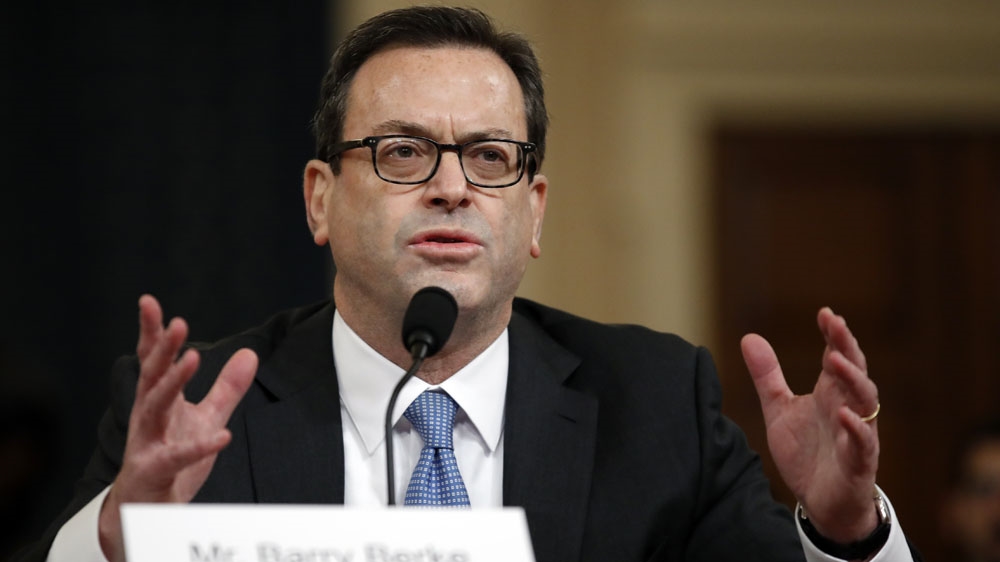
Collins: Impeachment inquiry about ‘a clock and a calendar’
Ranking Republican on the Judiciary Committee Doug Collins characterised the Democrat-led impeachment inquiry into Trump as “all about a clock and calendar” as the 2020 election approaches.
Collins said the Democrats were using impeachment as a last-ditch effort to remove Trump from office because they don’t think they can beat him in an election.
“They don’t have a candidate they think can beat him,” he said during opening statements on Monday.
Collins: ‘We’ve taken a dangerous turn’
Collins has said the impeachment inquiry has taken a “dangerous turn” with Democrats using subpoenas as a “political vendetta”.
Collins said accused Democrats of bending the facts to make them fit impeachable offences.
“They don’t care what was in the transcript, they don’t care what happened,” Collins said, adding Democrats just want to “make it fit their narrative”.
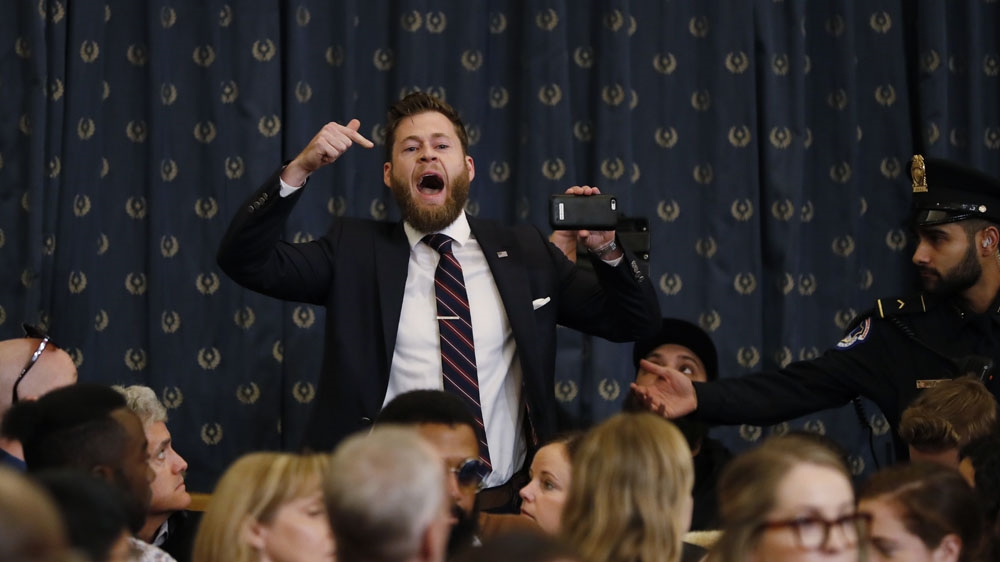
Nadler: Trump’s behaviour part of ‘pattern’
Jerrold Nadler, the chairman of the Judiciary Committee, framed the impeachment proceedings against President Donald Trump as a race against time before the 2020 elections.
“The integrity of our next election is at stake, nothing could be more urgent,” said Nadler.
He said that Trump “took” Russian interference in the 2016 election, and “demanded” interference from Ukraine in 2020.
He also referenced reports that Trump’s personal lawyer, Rudy Giuliani, was back in Ukraine last week “in an apparent attempt to gin up the same so-called ‘favours’ that brought us here today and forced Congress to consider the impeachment of a sitting president.”
“This pattern of conduct represents a continuing risk to the country,” Nadler said.
Nadler: If we could ‘drop blinders’ we could all agree on common facts
Jerrold Nadler, the chairman of the Judiciary Committee, said testimony by witnesses in the House impeachment inquiry into Trump shows that the president “put himself before country” in his dealings with Ukraine.
“If we could drop our blinders for just one moment, I think we could agree on a common set of facts,” Nadler said in his opening statements on Monday.
Protester briefly interrupts hearing
A protester briefly interrupted the House Judiciary Committee hearing in the impeachment investigation into Trump.
The protester accused Democrats leading the probe of being guilty of “treason” as he was escorted from the hearing.
Chairman Jerrold Nadler, a Democrat, then told spectators at the public meeting that they are there to “observe but not to demonstrate”.
Trump impeachment inquiry explained in 600 words
What are articles of impeachment? What’s this inquiry about? What happens next?
Get up-to-date with the impeachment inquiry here.
House Judiciary hearing sets stage for Trump impeachment charges
Pushing ahead with articles of impeachment, the House Judiciary Committee convenes Monday to formally receive the investigative findings against President Donald Trump as the White House and its allies launch an aggressive attack on Democrats and the proceedings.
Chairman Jerrold Nadler expects the committee to vote soon, possibly this week, on at least two or more charges against the Republican president.
Read what to expect here.
Refresher: What is impeachment?
The founders of the United States included impeachment in the US Constitution as an option for removal of presidents by Congress. Delegates to the constitutional convention of 1787 in Philadelphia agreed that presidents could be removed if found guilty by Congress of “treason, bribery or other high crimes and misdemeanors”.
The sole authority under the Constitution to bring articles of impeachment is vested in the House of Representatives where proceedings can begin in the Judiciary Committee. If the House approves articles of impeachment, or “impeaches” a president, he or she would then be subject to trial in the US Senate.
Read more on the US impeachment process here.
Wednesday, December 4
Missed Wednesday’s hearing?
Read the main takeaways from the House Judiciary hearing here.
First lady scolds witness for mocking son’s name
Melania Trump said a Democratic witness at the House Judiciary Committee’s impeachment hearing should be “ashamed″ for bringing up the name of her 13-year-old son, Barron.
Karlan during her testimony said that “contrary to what President Trump has said, Article 2 [of the Constitution] does not give him the power to do anything he wants … The Constitution says there can be no titles of nobility, so while the president can name his son Barron, he can’t make him a baron.”
Melania Trump said, “Pamela Karlan, you should be ashamed of your very angry and obviously biased public pandering, and using a child to do it.”
A minor child deserves privacy and should be kept out of politics. Pamela Karlan, you should be ashamed of your very angry and obviously biased public pandering, and using a child to do it.
— Melania Trump (@FLOTUS) December 4, 2019
Karlan later said that she regretted making the remarks.
Pelosi to Democrats: ‘Are you ready?’
Speaker Nancy Pelosi posed a simple question to House Democrats behind closed doors Wednesday as the Judiciary Committee considered articles of impeachment against President Donald Trump.

“Are you ready?” she asked rank-and-file legislators.
The answer was a resounding “yes”.
The Democrats also gave a standing ovation to Chairman Adam Schiff, whose Intelligence Committee report catalogued potential grounds for impeachment, and they overwhelmingly indicated they want to continue to advance the inquiry on its current path.
The meeting was described to the Associated Press news agency by people familiar with it, who were unauthorised to discuss it by name and were granted anonymity.
Report: Giuliani meeting with Ukrainian officials in Europe
Even as Rudy Giuliani’s unofficial diplomacy in Ukraine faces increased scrutiny under the House impeachment inquiry into President Trump, he has recently met with former Ukrainian officials for a documentary series aimed at debunking the investigation, the New York Times reported on Wednesday.
On Tuesday, Giuliani, Trump’s personal lawyer, met in Budapest with former Ukrainian prosecutor Yuriy Lutsenko, who has loomed large over the impeachment inquiry, the newspaper reported. On Wednesday, Giuliani travelled to Kyiv to meet with Viktor Shokin and Kostiantyn Kulyk, two other former Ukrainian prosecutors whose claims have been touted by Republicans, according to the report.
“Like a good lawyer, I am gathering evidence to defend my client against the false charges being levelled against him” by the news media and Democrats, Giuliani told the New York Times when asked about the meetings.
White House spokeswoman criticises testifying legal scholars
White House spokeswoman Stephanie Grisham accused three legal scholars testifying in the House judiciary committee hearing as having “known biases” against President Trump.
In a tweet, Grisham said that “3 of 4 ‘experts’ in this sham hearing have known biases” against the president.
“Not only is @POTUS given no rights in this process, the Dems’ ‘witnesses’ made up their minds long before today,” she said.
3 of 4 “experts” in this sham hearing have known biases against @realDonaldTrump. Not only is @POTUS given no rights in this process,the Dems' “witnesses” made up their minds long before today.The people of this country are being cheated of a Congress who works for them.
— Kayleigh McEnany (@PressSec) December 4, 2019
Scholar Turley says he does not see proof of ‘quid pro quo’ in House intelligence report
Constitutional scholar Jonathan Turley, the only expert called by Republicans to testify before the House Judiciary Committee, said that the report by the House Intelligence Committee did not show proof of “quid pro quo” (Latin for “a favour for a favour“).
Turley said the report has “left doubts” about what actually occurred in president’s dealings with Ukraine. He noted his interpretation differed from the other legal scholars testifying on Wednesday.
“There’s a difference between requesting investigations and a quid pro quo,” said Turley. “You need to stick the landing on the quid pro quo.”
Scholar Turley refutes that Trump’s action was ‘clear case of bribery’
Constitutional scholar Jonathan Turley, the only expert called by Republicans to testify before the House Judiciary Committee on Wednesday, said that it was not clear cut that President Trump committed bribery.
Turley, a law professor at George Washington University, was refuting claims by other legal witnesses that Trump’s conduct in pressuring Ukraine to commit to politically motivated investigations, as detailed in other witness testimony, constituted bribery.
Turley also said that claims that Trump obstructed justice by not cooperating with the House investigation was also not clear cut, as the Trump administration was taking their objection to court.
“If you make a high crime and misdemeanor out of going to the courts, it is an abuse of power. It’s your abuse of power,” Turley told legislators. “You are doing precisely what you’re criticising the president for doing.”
Scholarly witnesses called by Democrats say Trump committed bribery
The three legal scholars called to testify by Democrats in the House Judiciary Committee hearing as part of the impeachment inquiry into President Trump have said that the president’s dealings with Ukraine constitute bribery.
“If what we’re talking about is not impeachable, then nothing is impeachable,” Michael Gerhardt, a professor of law at the University of North Carolina said during questioning by the Democratic counsel.
Trump campaign criticises testifying constitutional scholars
As the House Judiciary Committee began its first hearing in the impeachment inquiry into President Trump, the president’s reelection campaign tweeted photos of the testifying constitutional scholars.
In a series of tweets that coincided with the opening statements by the witnesses, the campaign referred in turn to Noah Feldman, Pamela Karlan, and Michael Gerhardt as “liberal professor” and accused them of holding Democratic allegiances.
Jonathan Turley, law professor at George Washington University called to testify by Republicans, was not featured in the tweets.
Meet liberal professor Noah Feldman.#JerryRigged pic.twitter.com/7ed6KBICAq
— Team Trump (Text VOTE to 88022) (@TeamTrump) December 4, 2019
Constitutional scholar Turley: legal case for impeachment ‘dangerous’
Constitutional scholar Jonathan Turley, the only expert called by Republicans to testify before the House Judiciary Committee on Wednesday, has said the current impeachment case laid out by democrats “is not just woefully inadequate, but in some respects, dangerous”.
“If the House proceeds solely on the Ukrainian allegations, this impeachment would stand out among modern impeachments as the shortest proceeding, with the thinnest evidentiary record, and the narrowest grounds ever used to impeach a president,” Turley, a law professor at George Washington University, said in his prepared testimony.
“That does not bode well for future presidents who are working in a country often sharply and, at times, bitterly divided,” he said.

Constitutional scholar Gerhardt: Trump’s conduct worse than Nixon’s
Constitutional scholar Michael Gerhardt, testifying before the House Judiciary Committee, has said President Trump’s actions are worse than President Richard Nixon’s.
“If left unchecked, the president will likely continue his pattern of soliciting foreign interference on his behalf in the next election,” Gerhardt said in his prepared opening statement.
“If Congress fails to impeach here, then the impeachment process has lost all meaning, and, along with that, our Constitution’s carefully crafted safeguards against the establishment of a king on American soil,” he said.
Constitutional scholar Karlan: Trump dealings ‘a cardinal reason why the Constitution contains an impeachment power’
Constitutional scholar Pamela Karlan, testifying before the House Judiciary Committee, has said President Trump’s dealings with Ukraine exemplify “why the Constitution contains an impeachment power”.
Karlan, a professor of law at Stanford University, said Trump’s actions “struck at the very heart of what makes this country the ‘republic’ to which we pledge allegiance”.
“This is not politics as usual – at least not in the United States or any other mature democracy,” she said in her prepared testimony.
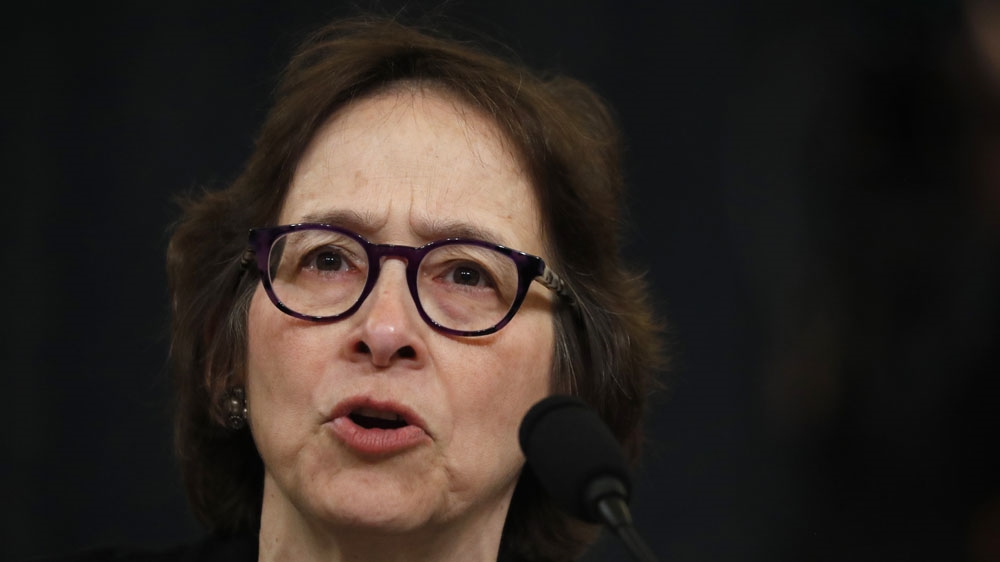
Constitutional scholar Feldman: Trump conduct ‘clearly constitutes impeachable high crimes and misdemeanors’
Constitutional scholar Noah Feldman, testifying before the House Judiciary Committee, has said President Trump’s dealings with Ukraine “clearly constitutes impeachable high crimes and misdemeanors”.
“The president’s conduct described by the testimony embodies the [Constitution] framers’ concern that a sitting president would corruptly abuse the powers of office to distort the outcome of a presidential election in his favor,” Feldman, a professor of law at Harvard University, said in his prepared testimony on Wednesday.
Collins: Impeachment inquiry is ‘a simple railroad job’
The ranking Republican on the House Judiciary Committee, Representative Doug Collins, blasted the Democrat-lead impeachment inquiry as a partisan attack on the president.
“This is not an impeachment. This is a simple railroad job,” Collins said during his opening statement.
“You just don’t like the guy,” Collins said of the president, “You haven’t liked him since November 2016.”
Nadler: If Trump not held ‘in check’ he will ‘almost certainly’ solicit election interference again
Jerrold Nadler, the Democratic chairman of the House Judiciary Committee, has cast the impeachment inquiry into President Trump as a race against time as the 2020 elections loom.
Nadler, giving his opening statement on Wednesday, said the facts showed that Trump sought foreign interference for his personal political gain and then obstructed the investigation.
“The President has shown us his pattern of conduct,” Nadler said. “If we do not act to hold him in check – now – President Trump will almost certainly try again to solicit interference in the election for his personal, political benefit.”
Nadler added that the House will “move swiftly” to charge the president if they determine he has committed an impeachable offense.
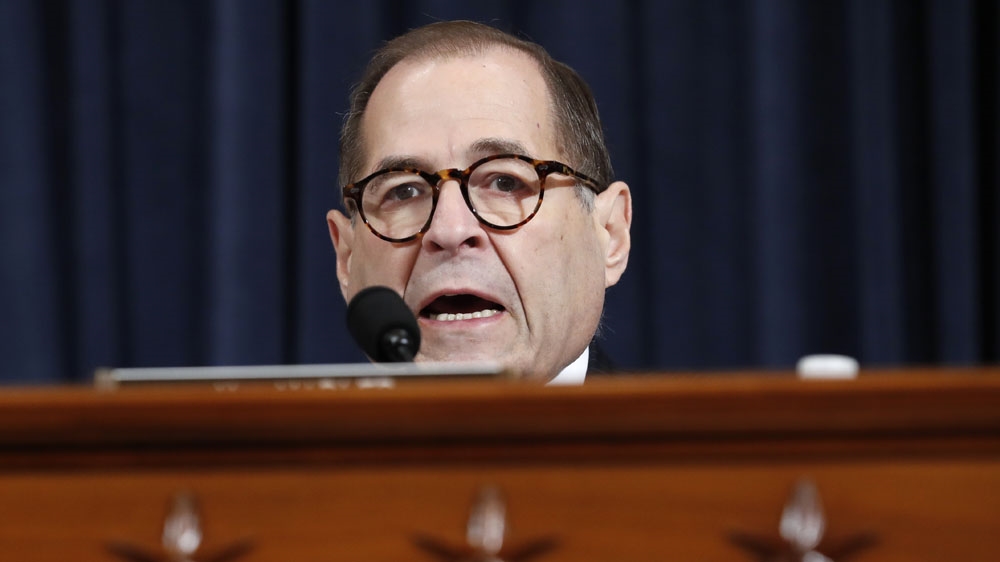
Refresher: What is impeachment?
The founders of the United States included impeachment in the US Constitution as an option for removal of presidents by Congress. Delegates to the constitutional convention of 1787 in Philadelphia agreed that presidents could be removed if found guilty by Congress of “treason, bribery or other high crimes and misdemeanors”.
The sole authority under the Constitution to bring articles of impeachment is vested in the House of Representatives where proceedings can begin in the Judiciary Committee. If the House approves articles of impeachment, or “impeaches” a president, he or she would then be subject to trial in the US Senate.
Read more on the US impeachment process here.
Trump: ‘I really don’t know’ why Giuliani called White House OMB
President Donald Trump has said he doesn’t know why his personal attorney Rudy Giuliani was speaking with the White House’s Office of Management and Budget, a revelation included in the House Intelligence Committee’s impeachment report.
“I really don’t know,” Trump said Wednesday, while attending the NATO summit in England, when reporters asked about a detail included in the report released Tuesday.
Trump encouraged reporters to ask Giuliani about the calls, but claimed they are “no big deal”.
The 300-page House report includes phone records obtained from AT&T and Verizon, showing extensive contact between Giuliani and the White House. On April 24, Giuliani had three calls with a number associated with the Office of Management and Budget, and eight calls with a White House number.
Trump’s comments came shortly before the Judiciary Committee began their first hearing in the investigation.
Trump cancels NATO press conference
US President Donald Trump said he has canceled a news conference meant for the end of the NATO summit in the UK and will return to Washington early.
The news conference, which was scheduled for Wednesday, likely would have taken place while the House Judiciary Committee holds its first hearing in Washington into the impeachment inquiry against him.
Trump impeachment probe to enter new phase with landmark hearing
In a landmark hearing on Wednesday, four constitutional law scholars will discuss whether the case against Trump meets a political and legal test for impeachment.
The four constitutional scholars who are scheduled to testify are Noah Feldman of Harvard Law School, Pamela Karlan of Stanford Law School, Michael Gerhardt, of the University of North Carolina School of Law and Jonathan Turley at George Washington University Law School.
Read more:
Tuesday, November 3
Impeachment inquiry: Giuliani, Nunes, WH in frequent contact
A new report from Democrats compiling evidence on impeachment has revealed extensive contact between Trump’s personal lawyer, Rudy Giuliani, and California Representative Devin Nunes, the top Republican on the intelligence panel, bringing to light new allegations by Democrats about phone calls between Trump’s allies.
The report released on Tuesday includes phone records obtained from AT&T and Verizon that show Giuliani also was in frequent contact with the White House and with Lev Parnas, a Giuliani associate who is under indictment on charges of using foreign money to make illegal campaign contributions.
The records show that Parnas and Nunes were in frequent contact last April, when Giuliani was publicly calling for an investigation into Biden.
Read more.
Evidence of Trump misconduct ‘overwhelming’: House report
Democrats accused Trump of abusing power to win re-election in 2020, saying in a report that will form the basis of any formal impeachment charges that he solicited foreign interference, undermined national security, and ordered an unprecedented campaign to obstruct Congress.
The Democratic-led House of Representatives Intelligence Committee, which has spearheaded the impeachment probe, said Trump had used US military aid and the prospect of a White House visit to compel his Ukrainian counterpart to “do his political bidding”.
Read more.